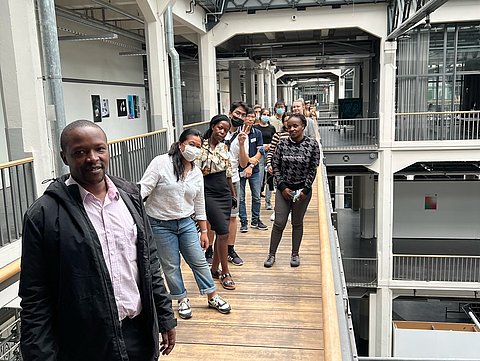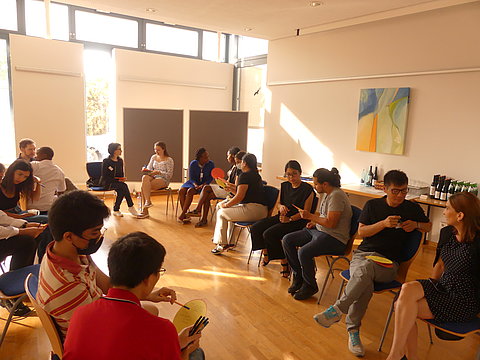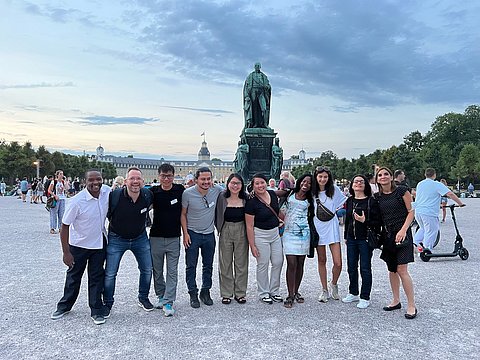Do we simply express emotions differently in the digital age, or does it mean much more? And what does the digital age do to us and our emotions? To explore these questions, fourteen KAAD scholarship holders met at Thomashof in Karlsruhe from 29 August to 01 September 2022 together with Dr. Anselm Feldmann of KAAD who hosted the seminar.
It was a great joy for the scholarship holders to meet again. They were from very different parts of the world: from Asia to the Middle East, Africa, Eastern Europe, and Latin America. Hence, the consideration of emotions in the digital age promised to be all the more interesting.
The participants shared their ideas on emotions in the digital age in an in-depth brainstorming session. First, they worked individually, then in increasingly larger groups and reflected upon the results afterwards all together. The group identified and discussed both positive and negative connotations. For example, opportunities to get in contact with people and to stay in contact, which is of particular interest to our scholarship holders, were very important. This, they said, leads to a sense of connectedness. They continue to be part of and have a part in the lives of those who they left. On the negative side, however, the participants also recognized that a lot of superficiality and hatred is stirred up, especially on social media. Feelings of fear and inferiority, but also isolation are often the result. According to them, this often has dire consequences for individuals as well as societies.
The next part, the presentation by PD Dr. Bernd Bösel from the University of Potsdam, dealt, among other things, with how technology companies take advantage of human emotions. In this context, technologies identifying emotions play a prominent role. This development can be problematic and must be scrutinized due to the controversial way emotions are conceptualized to be identified technologically, Bösel said. A reduction to seven basic emotions (joy, anger, disgust, fear, contempt, sadness, and surprise) shared by all people regardless of social or cultural background, as Ekman and Friesen (1978) suggest, does not do justice to the complexity of expressing emotions and cannot be empirically demonstrated in this way, says Bösel. However, the effects of the application of Ekman and Friesen's ideas are reality-shaping due to the market power of the Big Five (Apple, Google, Microsoft, Facebook, Amazon), who rely on this conceptualization. This has consequences, for example, for dealing with mental illness, but also for police operations at demonstrations - especially in non-democratic states. The knowledge that negative emotions, for example, are more likely to lead to interaction is applied by the Big Five in the algorithms of their platforms. The implications for societies worldwide are widely felt.
In the following reflection among participants, ideas from the brainstorming session and the presentation were brought together. The individual experiences mirrored the reflections from the conceptual perspective of the lecture and thus came together to form a coherent picture.
In the evening, a church service was celebrated in the open air under the direction of Father Prof. Dr. Thomas Eggensperger OP. With prayers and songs in different languages, the group could experience the unity in diversity typical for KAAD.
Afterwards, some participants visited the Lichtspiele at Karlsruhe Castle: a stunning event that brought together light and music and thus aroused emotions. This provided a great introduction to the guided tour at the Center for Art and Media (ZKM), Karlsruhe the following day. The participants were able to experience in a striking way that emotions and technology are also closely interwoven in the artistic field. They realized that while technology is always new, the questions posed to us as societies are often the same.
Fascinated by the guided tour, the seminar group subsequently explored the city and its palace garden to enjoy fellowship over pizza in the evening.







